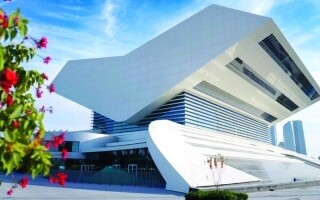
Today, under the theme 'Shaping the Future of Publishing,' the second Dubai International Libraries and Publishing Summit kicks off, organized by the Mohammed bin Rashid Library. The event, held at the Mohammed bin Rashid Library, features a program with over 45 sessions discussing innovation, technology, the global publishing landscape, translation, meaningful publishing, the art of writing, and more.
The summit will host more than 80 speakers from cultural and literary sectors across 14 countries. Participants include representatives from university presses, literary agents, organizations overseeing literary awards, commercial libraries, the local publishing community in the UAE, and representatives from three of the world's top five commercial publishing houses.
Ibrahim Al Hashemi, Chairman of the Higher Committee for the Dubai International Libraries and Publishing Summit 2025, told 'Al Ittihad' newspaper: 'The summit's theme, 'Shaping the Future of Publishing,' has become a symbol in itself. Therefore, the event serves as a strategic platform to discuss the future of this industry in the Arab world and globally. It highlights the key challenges and opportunities facing the publishing sector, while also fostering collaboration among publishers, authors, and creators to develop practical solutions for future challenges and contribute to the digital transformation journey, aligning with the aspirations of future generations.'
He added: 'The summit brings together an elite of the world's leading institutions and publishing houses to share their experiences, alongside prominent Arab publishing organizations that have significantly shaped the industry. These include the Emirates Publishers Association, as well as various universities, libraries, and international cultural organizations that enhance Dubai's status as a global hub for cultural dialogue and the future of publishing.'
Specialized Workshops
Al Hashemi emphasized that the summit's distinct focus is its practical approach through specialized workshops that blend creativity and skills across various fields, including translation, editing, children's books, and the art of printing. He noted that these workshops provide a valuable opportunity for institutions, authors, editors, and ambitious publishers to acquire new tools for reaching readers and successfully entering the rapidly evolving global industry.
He affirmed that the Mohammed bin Rashid Library has set a major and unique example for libraries, transforming into an intellectual hub that encompasses numerous workshops, music, seminars, lectures, and events. It has moved beyond the traditional concept of a library, and this is the direction all libraries should head towards.
An Attraction Factor
Jamal Al Shahi, a member of the Higher Committee, highlighted the summit's importance in uniting libraries and the publishing industry simultaneously, especially as the latter faces numerous challenges alongside future opportunities and prospects. He explained that the Mohammed bin Rashid Library chose this theme to give the conference momentum, particularly as content is the lifeblood of libraries.
He confirmed that Dubai is a pioneer in modern libraries. Despite the emirate's economic focus, it possesses significant experience in the cultural domain. When the Mohammed bin Rashid Library was inaugurated, it adhered to international standards. Libraries are not just repositories for books; they are centers of cultural activity, technological advancement, literary production, and host various events. The Mohammed bin Rashid Library recognized this early on.
Al Shahi praised the library's ability to attract youth through its programs, offering numerous services to school and university students, with the youth demographic forming the majority of event attendees.
He described technological development as the lifeblood of cultural life, noting that Dubai has made significant strides in the digitalization and artificial intelligence integration within its libraries. He pointed out that Arab libraries need to exert more effort in the technological sphere, as well as in developing the collections and programs they offer to the community, to avoid becoming isolated from their members.
He believed that the shift towards digitalization in the library world does not negate the value of printed books, which remain the primary source of knowledge. However, one cannot turn a blind eye to the ongoing technological advancements, and a balance between the two must be struck.














